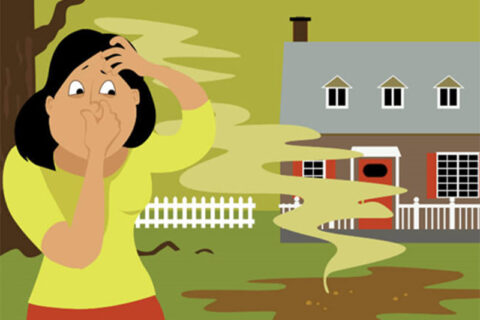Have you ever walked into your kitchen, bathroom, or laundry room and been hit with a foul smell wafting up from the drains? You’re not alone—drain odors are a common household issue. Once you understand the source, you can take steps to eliminate and prevent drain odors from recurring.
Common Sources of Drain Odors
Shower and sink drains can develop bad smells for various reasons. Some of the most common ones include:
- Dry P-traps: Smelly sink and shower drains are often attributed to a dry P-trap. This bent section of pipe under your sink or shower drain holds water to create a barrier against rising sewer gases. If this trap dries out due to infrequent use, foul odors may emanate from the drain.
- Biofilm buildup: Another frequent culprit is biofilm in the pipes. Everyday items like soap scum, food particles, and grease may line your sink and shower drains. Over time, these materials create a biofilm, a slimy layer where bacteria thrive and emit a foul smell.
- Sewer line issues: If you notice drain odors throughout your house, there might be a blockage in the main sewer line. Failing to act could result in a messy sewer backup, so don’t ignore widespread sewage smells in your home.
- Venting problems: The vent pipes in your sewer system remove sewer gases and regulate air pressure within the pipes. If these vents are blocked by snow, leaves, or animal nests, sewer gases may waft into your home.
- Rotting food: Kitchen drain odors are often caused by trapped food particles that slowly decompose, leading to a distinct, unpleasant smell. This issue is exacerbated if you don’t use the sink frequently enough to flush particles away.
- Mold: Mold growth is another common cause of bad odors, especially in pipes where water often stagnates. Moldy drains emit a musty smell and can pose health risks.
How to Get Rid of Drain Odors
Eliminating drain odors often requires a combination of cleaning and maintenance. Here’s a simple guide to help you tackle those unpleasant smells:
- Running water: In the case of empty P-traps and seldom-used drains, simply run water for about a minute to fill the trap and flush particles further down the drain.
- Boiling water and baking soda: If tap water isn’t enough, pour a cup of baking soda down the drain, followed by near-boiling water. This combination helps to dissolve and loosen organic matter that might be causing the smell.
- Vinegar follow-up: After the baking soda and hot water, follow up with a cup of white vinegar to break down grime further and neutralize odors.
- Bleach solution: If you don’t have baking soda and vinegar on hand, or you want to try something a little stronger, pour a one-to-one mixture of water and bleach down the drain to deodorize the inner pipe wall.
- Plunging and snaking: Use a plunger or plumbing snake for slow drains and stubborn, odor-causing clogs.
- Professional help: If these home remedies don’t work, consider calling a professional. Plumbers can help with bigger issues like venting problems or significant sewer line clogs.
Preventing Future Odors
Preventing drain odors requires regular maintenance and good habits. Here are some practical tips to keep your drains fresh and odor-free:
- Regular cleaning: Pour a pot of near-boiling water down your drains weekly to prevent biofilm buildup. Then, use baking soda and vinegar once a month to maintain cleanliness.
- Enzymatic cleaners: These cleaners are great for breaking down organic material in the pipes, but they take a while to work. Use them as a preventative measure for drain odors and clogs.
- Drain strainers: Install mesh strainers in sinks and showers to catch hair, food particles, and other debris. As they start to fill up, empty the contents into a trash can.
- Mindful disposal: Be careful about what you pour down the drain. Avoid disposing of grease, coffee grounds, and other smelly, drain-clogging foods.
- Vent pipe maintenance: Ensure your home’s vent pipes are clear and functioning. Most terminate above the roof, so you may want to hire a professional to check on them rather than climbing onto the roof yourself.
- Annual plumbing checks: Have a professional plumber check your system once a year. They can spot and fix potential issues before odors develop.
Partner with Specialty Plumbing
Persistent drain odors are frustrating. If you’ve tried the tips outlined above without success, it’s time to contact Specialty Plumbing. As a family-owned and operated business, we prioritize clear communication and customer satisfaction. Our team has years of experience diagnosing and resolving all types of plumbing issues, including pesky drain odors. Rest assured that we explain our work before starting to ensure you understand what’s involved. So, if you’re tired of drain odors in your North DFW home, contact us at 972-730-9314 to request professional plumbing services today.
